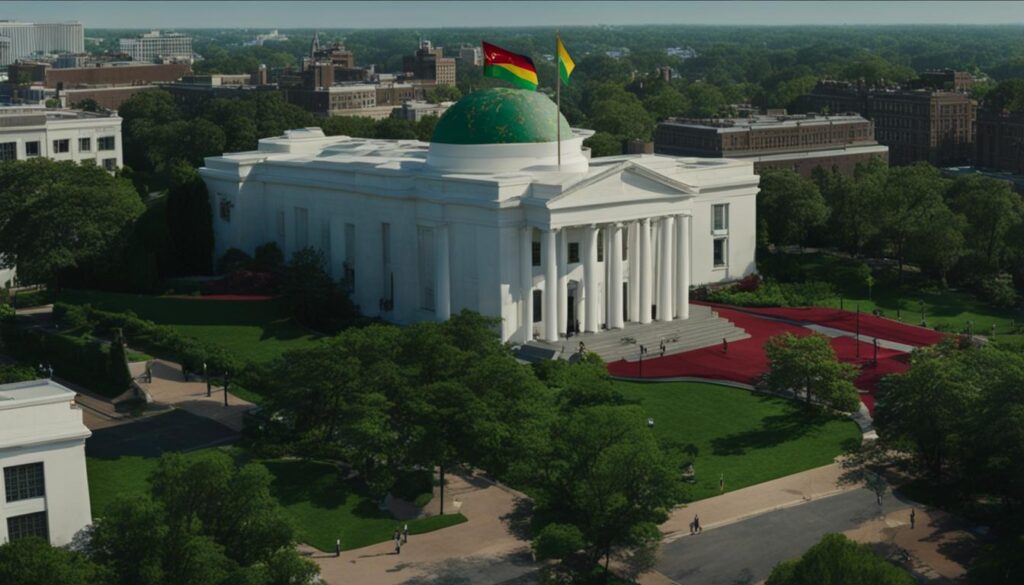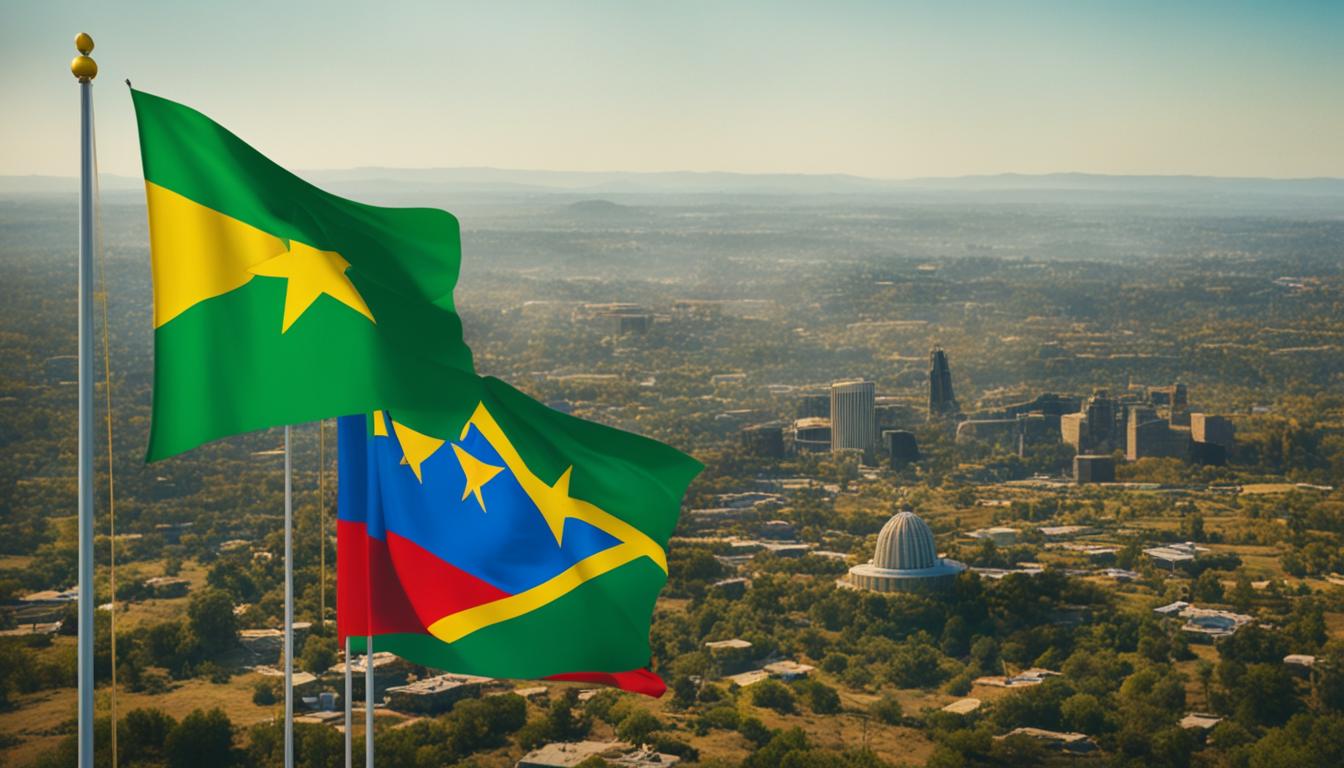Are Ethiopia and US Allies?
Did you know that Ethiopia and the United States have a diplomatic relationship that spans over 120 years? This long-standing partnership has shaped their interactions in various domains, including military cooperation, economic ties, and diplomatic relations.
Key Takeaways:
- Ethiopia and the United States have a diplomatic relationship that goes back over a century.
- Both countries have mutual interests in areas such as peace and security, economic development, and health.
- The United States is Ethiopia’s largest bilateral donor and provides significant humanitarian assistance.
- Challenges such as internal conflicts, human rights concerns, and climate change impact the Ethiopia-US partnership.
- The future of Ethiopia-US relations will depend on continued collaboration and support for democratic reforms.
Peace and Security
Despite internal conflicts that continue to threaten Ethiopia’s stability, the country has made significant strides towards peace. The recent “Agreement for Lasting Peace through a Permanent Cessation of Hostilities” between the Ethiopian government and the Tigray People’s Liberation Front is a crucial step towards sustainable peace. The United States is committed to supporting political processes that bring peace and stability to Ethiopia, especially in regions like Amhara and Oromia.
As conflicts persist in various parts of Ethiopia, the pursuit of peace and security remains a top priority. The establishment of lasting peace requires dialogue, mediation, and conflict resolution efforts. The “Agreement for Lasting Peace through a Permanent Cessation of Hostilities” represents a significant breakthrough in the ongoing conflict in Tigray and demonstrates Ethiopia’s commitment to resolving internal disputes.
The recent peace agreement is a crucial step towards stability in Ethiopia, and it paves the way for the resolution of conflicts in other regions as well. The international community, including the United States, recognizes the importance of peace and security in Ethiopia, and stands ready to support initiatives that promote stability.
The United States has been a strong advocate for peace and security in Ethiopia. Through diplomatic channels and international partnerships, the US actively supports political processes that aim to address the root causes of conflict and promote sustainable peace. In particular, the US has been engaged in peacebuilding efforts in regions like Amhara and Oromia, where tensions and violence have threatened stability.
Recognizing the interconnectedness of peace, security, and development, the United States understands the importance of fostering a peaceful environment for Ethiopia’s economic growth and social progress. By supporting conflict resolution initiatives and investing in stability, the US aims to contribute to Ethiopia’s journey towards peace and prosperity.
Economic Relations
Ethiopia has experienced remarkable economic growth, positioning itself as one of the fastest-growing economies in Africa. Between 2005 and 2019, the country achieved an average annual GDP growth rate of nearly 10%. However, multiple challenges have hindered Ethiopia’s economic progress, including the COVID-19 pandemic, internal conflicts, and a shortage of foreign exchange.
Despite these setbacks, the United States and Ethiopia maintain strong economic ties, with robust trade in goods. Major American companies such as Boeing and Coca-Cola have established a significant presence in Ethiopia, contributing to the country’s economic development.
US-Ethiopia Trade
The trade relationship between the United States and Ethiopia is mutually beneficial. In 2020, the bilateral trade in goods reached $1.4 billion, with US exports accounting for approximately $1.2 billion of that total. Ethiopia primarily exports textiles, coffee, and agricultural products to the US, while importing machinery, vehicles, and aircraft.
This trade partnership plays a vital role in supporting economic growth and job creation in both countries. It fosters opportunities for investment, technology transfer, and knowledge sharing, contributing to the development of Ethiopia’s private sector.
Foreign Exchange Shortage
One of the significant challenges Ethiopia currently faces is a shortage of foreign exchange. This scarcity limits the ability of businesses, including importers, to access the necessary foreign currency for their operations. It affects both the private sector and the government’s ability to finance essential imports, such as fuel, machinery, and raw materials.
The Ethiopian government has implemented various measures to address this issue, including encouraging exports, promoting foreign direct investment, and strengthening the financial sector. Additionally, partnerships with international institutions, such as the International Monetary Fund (IMF), aim to alleviate the foreign exchange shortage and support Ethiopia’s economic stability.
Economic Growth Potential
Despite the current challenges, Ethiopia’s economic growth potential remains substantial. The country possesses abundant natural resources, a large and young workforce, and a strategic geographical location. Furthermore, ongoing infrastructure development projects, such as the Grand Ethiopian Renaissance Dam, are expected to enhance energy capacity and stimulate economic growth.
“Ethiopia has great potential for economic development and offers attractive investment opportunities. As our partnership with Ethiopia continues to grow, we are confident that the country’s economic resilience will overcome the existing challenges.” – US Investor
The United States recognizes Ethiopia’s economic potential and remains committed to supporting its growth and development. Through collaborative efforts, both countries can navigate the current obstacles, foster economic resilience, and strengthen their economic partnership.
Bilateral Assistance
At the heart of our partnership with Ethiopia is our unwavering commitment to providing bilateral assistance and support. As the largest bilateral donor to Ethiopia, the United States recognizes the importance of aiding and empowering the Ethiopian people. Through our assistance programs, we aim to address the critical needs of vulnerable populations, foster sustainable development, and promote humanitarian values.
Since 2020, the United States Agency for International Development (USAID) has allocated a significant amount of humanitarian assistance to Ethiopia, totaling approximately $3.6 billion. This aid aims to alleviate the impact of ongoing conflicts and recurrent climate shocks that have disrupted the lives of countless Ethiopians.
In Fiscal Year 2022 alone, the United States provided Ethiopia with $1.93 billion in bilateral assistance, with a particular focus on humanitarian aid. This funding supports various sectors essential to the well-being and resilience of the Ethiopian people. It includes vital support for agriculture, nutrition, water, sanitation, and health services.
One area of significant concern that the United States actively addresses is the protection of vulnerable populations, including refugees. As Ethiopia hosts one of the world’s largest refugee populations, our support is crucial in ensuring their safety and well-being. Through our humanitarian assistance, we strive to provide the necessary resources to mitigate their hardships and create a more stable future for them.
“The United States remains committed to partnering with Ethiopia and offering assistance to those in need. Through our ongoing support, we aim to promote peace, stability, and prosperity for all Ethiopians.”
Overview of US Aid to Ethiopia (2022)
| Sector | Allocation (in millions) |
|---|---|
| Agriculture | $500 |
| Nutrition | $250 |
| Water and Sanitation | $400 |
| Health | $300 |
| Protection of Vulnerable Populations | $480 |
Our bilateral assistance goes beyond providing immediate relief; it seeks to build resilience and empower communities for a brighter future. Our partnership with Ethiopia extends beyond the financial aspect, as we collaborate closely with local organizations and government institutions to ensure the effective delivery of aid.
By working together, we can make a meaningful and lasting impact on the lives of Ethiopians, creating a path towards stability, prosperity, and a better tomorrow.
Health Assistance

When it comes to improving the health and well-being of the Ethiopian people, the United States is a committed partner. Through generous funding from the U.S. Agency for International Development (USAID), over $154 million is invested annually to strengthen Ethiopia’s national health system and enhance the quality of health services across the country.
Ethiopia faces significant challenges in combating major diseases such as HIV/AIDS and malaria. However, the U.S. has made substantial investments to support Ethiopia’s response to these health crises. Through the President’s Emergency Plan for AIDS Relief (PEPFAR), nearly $3 billion has been dedicated to fighting HIV/AIDS in Ethiopia. This funding has been instrumental in supporting various aspects of the HIV/AIDS response, including treatment, prevention, and workforce development.
Furthermore, the President’s Malaria Initiative (PMI) has invested $544 million since 2008 to combat malaria in Ethiopia. These funds have contributed to significant reductions in malaria-related deaths and improved access to diagnostic tests and treatment.
The U.S. remains committed to working alongside Ethiopia in the ongoing battle against these devastating diseases. Together, we strive to improve the health outcomes and well-being of the Ethiopian people, ensuring a healthier and more prosperous future for all.
Democracy, Governance, Human Rights
In the pursuit of peace and stability in Ethiopia, internal conflicts have posed significant challenges and resulted in human rights abuses. While the human rights situation in the country remains a matter of concern, there have been recent improvements that offer hope for progress. The United States stands committed to supporting democracy, the protection of human rights, and the mitigation of conflicts in Ethiopia.
We recognize the importance of fostering a democratic society where the rights and freedoms of all individuals are respected. To achieve this, various US agencies, such as the Bureau of Democracy, Human Rights, and Labor (DRL), provide financial assistance to advance these shared goals. By supporting initiatives that promote good governance, transparency, and accountability, we aim to strengthen the foundations of democracy in Ethiopia.
“The United States remains committed to supporting democracy, respect for human rights, and conflict mitigation in Ethiopia.”
Democracy is not just about elections; it is about creating an inclusive society where citizens can participate meaningfully in decision-making processes. Through diplomatic engagements, capacity building programs, and civil society partnerships, we work towards broader democratic reforms in Ethiopia. By empowering marginalized groups and fostering a culture of dialogue and reconciliation, we aim to address the root causes of conflicts and promote lasting peace.
US Support for Ethiopian Democracy
Our support for Ethiopian democracy is multifaceted, encompassing various areas, including:
- Strengthening democratic institutions and electoral processes
- Promoting freedom of expression and a vibrant media landscape
- Enhancing the rule of law and access to justice
- Protecting the rights of marginalized communities, women, and children
- Fostering civic education and participation
Through these efforts, we strive to empower Ethiopian citizens to actively engage in shaping their nation’s future.
Conflict Mitigation
Ethiopia’s internal conflicts have deeply affected the lives of its people and hindered the progress towards peace and stability. As a partner to Ethiopia, the United States is committed to supporting initiatives that mitigate conflicts and promote reconciliation.
Conflict-sensitive approaches that address the root causes of tensions, promote dialogue, and support peaceful resolutions are at the forefront of our efforts. We work closely with local communities, civil society organizations, and regional partners to foster understanding, build trust, and facilitate inclusive processes that lead to lasting peace.
The image above highlights the importance of respecting and protecting human rights in Ethiopia. It serves as a reminder of the work that needs to be done to ensure that every individual in the country can live with dignity, freedom, and equality.
Climate and Food Security

Ethiopia is facing significant challenges in the realms of climate change and food security. The impact of climate change, including droughts and unpredictable weather patterns, has severely affected agricultural productivity and food availability. This, coupled with a growing population, puts immense pressure on Ethiopia’s ability to ensure food security for its citizens.
Recognizing the urgency of the situation, the United States is actively supporting Ethiopia in building climate resilience and promoting sustainable agricultural practices. Through initiatives like Feed the Future, we are working closely with Ethiopian farmers and communities to develop resilient and sustainable agricultural and food systems.
Our support aims to alleviate food insecurity by improving agricultural productivity, enhancing access to markets, and empowering smallholder farmers. We are investing in climate-smart technologies and practices that help farmers adapt to changing climatic conditions, such as drought-tolerant seeds, efficient irrigation systems, and soil conservation techniques.
In addition to strengthening agricultural resilience, we are also committed to improving disaster management and response capabilities in Ethiopia. By building capacity, enhancing early warning systems, and providing training on disaster preparedness, we aim to minimize the impact of natural disasters on food security.
Together, we are working towards improving climate information and management to enable informed decision-making and effective planning. By investing in research and technology, we aim to provide accurate and timely climate data that can guide policymakers and farmers in making climate-resilient agricultural choices.
In 2023, the United States provided significant food assistance to over 13 million food-insecure Ethiopians, demonstrating our commitment to addressing immediate food security needs. However, our long-term goal is to support Ethiopia in building a self-reliant and sustainable food system that can withstand the challenges posed by climate change.
“Investing in climate resilience and food security is not just about ensuring access to food today; it is about building a sustainable future for Ethiopia and its people.”
With continued collaboration and innovative approaches, we believe that Ethiopia can overcome the challenges of climate change and achieve food security for all its citizens.
Education and Youth Empowerment
In Ethiopia, the education system has faced significant challenges due to conflicts and other issues, resulting in a high number of out-of-school children and damaged schools. We recognize the importance of education as a key driver of social and economic development, which is why the United States, through the United States Agency for International Development (USAID), is actively supporting initiatives to address these pressing issues.
One of our primary goals is to bring children back to school and create safe learning environments. Working closely with the Ethiopian government and local partners, USAID invests in programs that focus on improving access to quality education, teacher training, curriculum development, and school infrastructure rehabilitation.
Furthermore, youth empowerment is a critical aspect of our efforts in Ethiopia. Through various programs, USAID aims to empower over 2 million young Ethiopians to invest in their own social and economic development. By providing vocational training, entrepreneurship opportunities, and mentorship, we seek to equip the youth with the skills and resources they need to succeed in the 21st century.
“Education is the most powerful weapon which you can use to change the world.”
– Nelson Mandela
By investing in education and empowering the youth, we believe in creating a brighter future for Ethiopia. Education not only helps individuals reach their full potential but also drives societal progress and economic growth. We are committed to working alongside our Ethiopian partners to strengthen the education system, ensure equal opportunities for all children, and foster the development of a skilled and capable workforce.
Bilateral Representation

The bilateral representation between Ethiopia and the United States is maintained through embassies in each country. The Ethiopian Embassy in the US is located in Washington, D.C., while the US Embassy in Ethiopia is located in Addis Ababa. These diplomatic missions play a crucial role in facilitating communication and cooperation between the two nations.
| Embassy | Location |
|---|---|
| Ethiopian Embassy in the US | Washington, D.C. |
| US Embassy in Ethiopia | Addis Ababa |
Historical Background
Ethiopia and the United States have a long and evolving history of diplomatic relations that dates back to 1903. Over the years, these two nations have cooperated and collaborated on various fronts, forging a bond that has weathered numerous challenges and milestones.
Throughout the course of their relationship, the United States has provided Ethiopia with valuable military assistance, economic aid, and development assistance. This support has played a pivotal role in Ethiopia’s growth and development, strengthening the ties between the two countries.
“The friendship between Ethiopia and the United States has stood the test of time, overcoming obstacles to foster cooperation and mutual understanding.”
-Anonymous
Undoubtedly, there have been periods of turbulence in the historical trajectory of Ethiopia-US relations. The Ethiopian Revolution and the rule of Mengistu Haile Mariam presented challenges and strained the bonds between the two countries. However, in the post-Mengistu era, the relationship improved significantly, leading to new avenues of collaboration.
Building Blocks of Collaboration
One noteworthy area of collaboration is counterterrorism. In the fight against terrorism, Ethiopia and the United States have partnered closely, sharing intelligence and coordinating efforts to combat extremist groups that threaten regional and global security.
In addition to counterterrorism, the two countries have collaborated on various humanitarian initiatives. The United States has extended substantial aid to Ethiopia, addressing the critical needs of vulnerable populations affected by conflict, climate shocks, and displacement.
Strategic Partnerships
Ethiopia and the United States have also pursued strategic partnerships, marked by significant milestones such as treaties and agreements. These instruments have served as pillars for collaboration and have helped shape bilateral relations.
| Treaties | Date |
|---|---|
| Ethiopia-US Friendship, Commerce, and Consular Convention | 1903 |
| Memorandum of Understanding on Cooperation in Agriculture | 2007 |
| Bilateral Investment Treaty | 2011 |
This table highlights some of the important treaties and agreements that have fostered collaboration between Ethiopia and the United States. Each of these instruments lays the foundation for continued partnership and mutual growth.
Recent Developments
In recent years, the relationship between Ethiopia and the United States has encountered several challenges. Legislation enacted by the US Congress, including the Ethiopia Democracy and Accountability Act in 2007, has put forward conditions tied to military aid, emphasizing the importance of human rights improvements. Additionally, Ethiopia’s role in the Global War on Terrorism and concerns surrounding human rights violations have influenced the dynamics of the relationship. Despite these hurdles, the United States remains firmly committed to supporting Ethiopia’s stability, development, and ongoing democratic reforms.
Conditions on Aid
The Ethiopia Democracy and Accountability Act, passed by the US Congress in 2007, has set conditions on military aid to Ethiopia. These conditions are based on the need for demonstrable progress in the realm of human rights. By linking aid to human rights improvements, the United States intends to encourage Ethiopia to take concrete steps towards safeguarding and promoting human rights within its borders.
Concerns and Engagement
Ethiopia’s involvement in the Global War on Terrorism has been an important factor that has influenced the relationship with the United States. As a partner in the fight against terrorism, the US has engaged with Ethiopia on various security issues. However, concerns about human rights violations have played a role in shaping this engagement, with the US advocating for improvements and continuing its dialogue to support Ethiopia’s progress.
“We recognize the challenges and complexities in Ethiopia’s journey towards stability and democratic reforms. Our commitment remains steadfast, as we encourage Ethiopia to address human rights concerns while supporting its development and stability.”
The image above illustrates the ongoing commitment of the United States to support Ethiopia’s progress, despite the challenges faced in recent years.
Conclusion
The partnership between Ethiopia and the United States is a critical alliance that spans diverse aspects such as peace and security, economic cooperation, health assistance, democracy, and education. Despite the challenges and recent developments, our countries have shared a long-term commitment to mutual interests and collaboration. For the future of Ethiopia-US relations, it is vital to continue fostering this partnership while focusing on supporting democratic reforms and addressing common challenges like conflict resolution, climate change, and food security.
Our partnership is built on a strong foundation of shared values and goals. Through continued cooperation, Ethiopia and the United States can work together to promote peace and security not only within Ethiopia but also in the entire region. By enhancing economic ties and investment, we can contribute to the growth and development of Ethiopia’s economy, fostering prosperity for both nations.
Furthermore, health assistance plays a vital role in our partnership. By strengthening Ethiopia’s health system and addressing diseases such as HIV/AIDS and malaria, we can improve the well-being of Ethiopian communities and contribute to regional health security.
As we navigate the future of Ethiopia-US relations, it is essential to emphasize the importance of democracy, good governance, and respect for human rights. By supporting democratic institutions and processes, we can assist Ethiopia in its journey towards a more inclusive and accountable society that upholds the rights of its citizens. Together, we can work towards a future where Ethiopia and the United States continue to thrive together, overcoming challenges and achieving shared goals.




